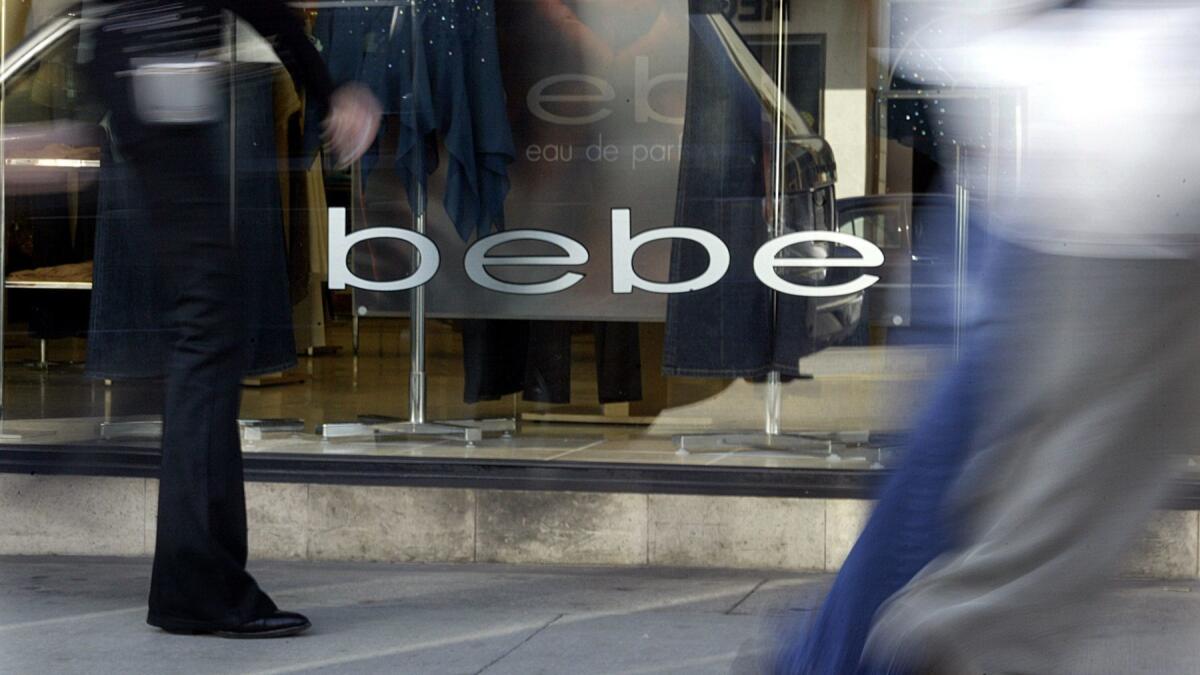Bebe is closing all its stores and focusing online, report says

Bebe Stores Inc., a mall retailer whose velour tracksuits were once ubiquitous fashion staples, is reportedly closing all its stores and focusing on its online business.
The Brisbane, Calif., company is trying to shut about 170 stores and avoid bankruptcy, according to Bloomberg, which cited unnamed people familiar with the situation. If not enough landlords agree to negotiate leases, the company may still have to file for Chapter 11 bankruptcy protection, the sources said.
The company could not be reached for comment.
Bebe is just the latest retailer to face this situation as bricks-and-mortar retailers scramble to keep up with the rise of e-commerce and changing consumer tastes. BCBG Max Azria Group closed 210 stores this year, and it’s planning to shut freestanding stores in Canada and consolidating operations in Europe and Japan after filing for Chapter 11 this month. American Apparel is closing all its stores by April after selling its intellectual property to Gildan Activewear.
Retailers catering to young shoppers have struggled as their customers have gravitated more toward fast-fashion chains such as Zara and H&M, analysts said. That’s especially the case for brands such as Bebe, which became known for party frocks along with rhinestone-studded tracksuits. (Juicy Couture, the other grande dame of velour tracksuits, closed all its U.S. stores by 2015.)
“It seems they are out of touch with what’s going on,” Jane Hali, chief executive of investment research firm Jane Hali & Associates, said of Bebe. “Millennials aren’t buying clothes for one occasion. They buy clothes that are more casual that can be dressed up or down.”
It’s a long fall for Bebe, which opened its first store in San Francisco in 1976. Founder Manny Mashouf, who remains chairman and chief executive, named the company using a play on a famous line in Shakespeare’s “Hamlet” — “To be or not to be.”
Over the last 4½ years, Bebe has lost nearly $220 million. Last year the company sold just under 50% of its brand to Bluestar Alliance, a brand management company. The move raised cash and also was intended to help Bebe develop a wholesale licensing business.
Bebe’s focus on its online business will be tricky to navigate, analysts said. Retailers have to master the logistical side, ensuring that deliveries and returns are seamless for Web orders. Retailers have also found that e-commerce sales can be higher in areas with physical stores, which give shoppers a chance to try on products and offer a place to return items in person.
To be a successful online merchant, “you really have to have your operations humming smoothly,” Hali said. “I don’t know if they have that down pat.”
Follow Shan on Twitter @ByShanLi
ALSO
Walking the enormous new Ikea in Burbank — all 2,000 steps of it
Fashion brands, including several L.A. retailers, are dying off as shoppers’ habits change
American Apparel rapidly grew its retail footprint. Did that strategy contribute to its collapse?







